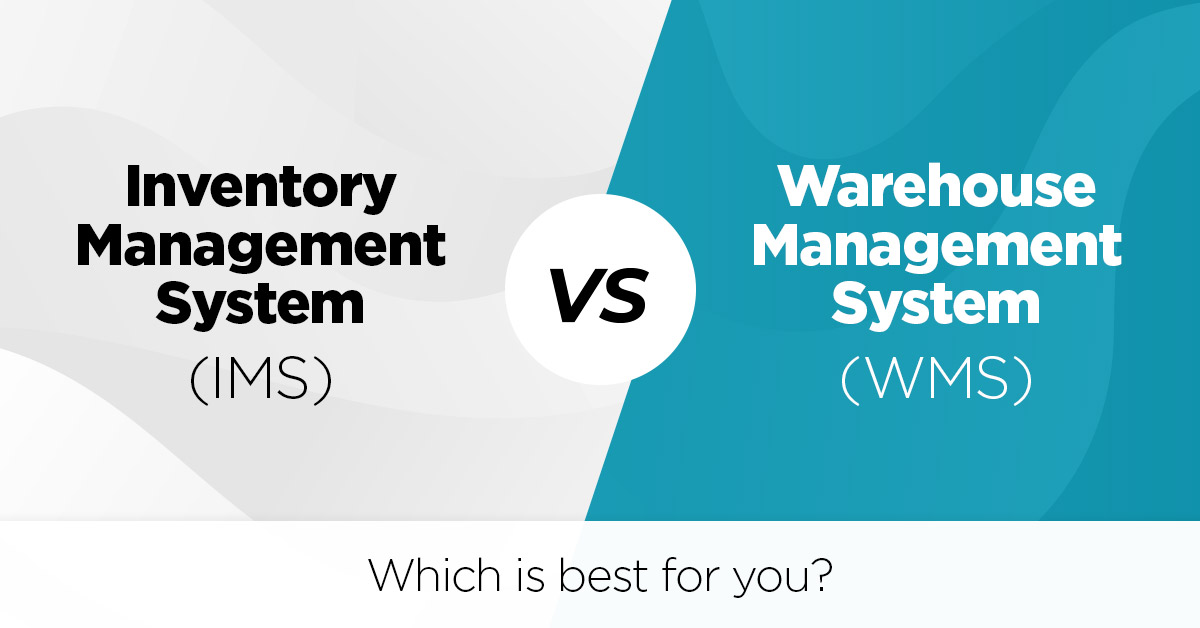
Businesses that involve warehouse operations are aware of the importance of having an inventory system in place to better manage their day-to-day activities.
Whether it is a small local retail store using spreadsheets to manually track its inventory or a large pharmaceutical distributor with multiple warehouse facilities, having complete visibility in its inventory and being able to leverage inventory-related data to enhance other business functions is crucial to the entire supply chain and the success of a company.
When companies decide to invest in an inventory management application, it is easy to be confused whether an Inventory Management System (IMS) or a Warehouse Management System (WMS) should be a better fit. Usually, products in the market are not explicitly labeled as one or the other.
In fact, they serve similar purposes when it comes to inventory control and warehousing activities, but they do have some differences in terms of functionalities and capabilities. Here are the key differences between IMS and WMS and to provide basic guidelines in determining the best option for your company.
Request More Info About Inventory and Warehouse Management Solutions
How Do IMS and WMS differ?
While both Inventory Management System (IMS) and Warehouse Management System (WMS) share some common inventory tracking capabilities; for example, tracking current stock level using Radio Frequency Identification (RFID) and barcode technology, reporting of storage location, turnover of different product types, etc., they have distinct functions when they are being used in different business sizes and settings.
What is a Warehouse Management System (WMS)?
WMS complements basic inventory management functionalities as discussed above with additional focus on managing the physical operations within warehouses.
For instance, labor and wave management can help to achieve maximum warehouse efficiency by optimizing workers’ travelling routes between different loading and unloading zones, bins/rack/aisle and pick/pack/ship areas. It can suggest picking sequences and oftentimes, scheduling daily work based on staff availability and their individual specialities.
For larger warehouses with high inbound and outbound volume, yard (or dock) management can help to facilitate loading dock availability scheduling, guiding trailers, or trucks to the right location at the right time, and coordinate with warehouse loading staff in case of cross-docking activity.

Moreover, warehouse design functions can suggest the best location for hot/seasonal items, convenient zones for stock replenishment, consolidation, and shipping, and allow standard workflow customization.
For B2C warehouses that rely heavily on daily parcel shipping, the shipping management function can assist on carrier selection, shipping rate management, label generation and printing, and possibly auto-select the right packaging given the volume and dimension of a shipment.
With the advanced features in warehousing, WMS not only covers the basic inventory control function, it also helps businesses to streamline their entire warehousing workflow by taking the floor activities and working staff into consideration.
IMS vs WMS: Which one should you choose?
There are numerous factors to evaluate when it comes to deciding which tool to use for your inventory control and warehouse operations.
The primary consideration is the size of your business. Inventory management systems (IMS) are beneficial for small and medium-sized businesses.
They are relatively easy and quick to implement, and they provide essential functions such as managing stock levels, locations, and reporting capabilities. IMS are especially useful for companies that are currently managing their inventory manually or using an outdated/inefficient system.
Another consideration is your budget and resources when it comes to obtaining user licenses, size of your project team and the total implementation span.
If your current warehouse size is relatively small with simple workflows and limited products, and you have limited man-hours to engage in all project implementation activities, IMS is most likely the right choice for you unless you foresee an aggressive warehouse expansion plan in the near future or an urgent need in business scalability.

On the other hand, if your inventory control and warehouse operations are considered complex with high daily inventory throughput, then you might require more advanced features that involves warehouse design, yard/dock management, workforce management, multi-location inventory management, advanced reporting, warehouse workflow automation, etc. to support future growth and scalability.
In this case, a warehouse management system (WMS) might be the logical option. In contrast to the inventory management system (IMS), WMS implementation usually engages a longer project timeline, a sizable project team to support different implementation activities. These include system integration, master data management, change management, testing and training.
Hence, a careful feasibility study on both options and a well-defined change management plan should be in place to help you decide the right solution for your business.
Request More Info About Inventory and Warehouse Management Solutions

